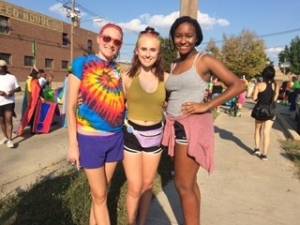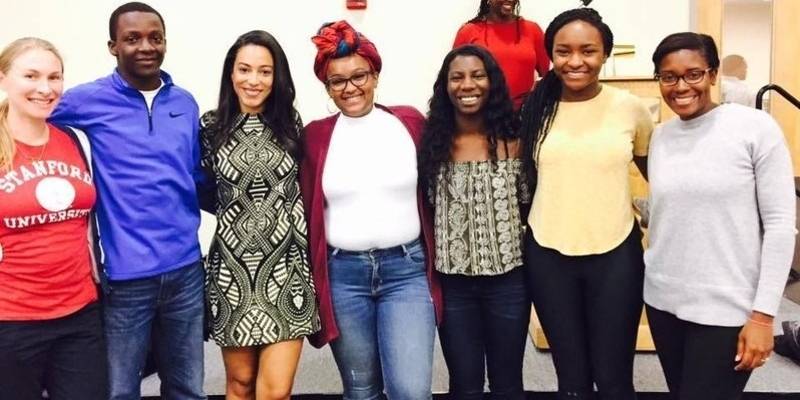In pop culture, political spheres, and social media there is no end of critiques on Millennials. Groaning about the next generation is a time-honored tradition going back centuries (dare I say, millennia?). And while Boomers yell about kids these days being on their phones, what many Millennials are witnessing in the digital space is fostering a movement to create change in the real world.
“I think it’s a misconception of youth today that they’re disengaged and always on their phones and looking at themselves,” said Centennial High School Social Justice Seminar instructor Lindsay Aikman. “These are adolescents who are so plugged in, they see the news as it happens with alerts on their phones and in their Twitter feeds. The students who are taking this class, and so many more who are not, feel the urgency of the time that we are in.”
Aikman is a 9th grade English teacher at Centennial, and has led the Social Justice Seminar for the last two years. The course takes students through the history of social justice both nationally and globally. There is an independent reading component where students are currently reading books such as The Hate U Give and I Am Malala, as well as activist presentations, and independent research all packed into one semester.
The students are currently finishing their Triple-A presentations, that’s Activist-Anthem-Action presentations. Students choose an activist to learn about, a protest song that relates to the movement, and present on the action that person took. Presentations this year have highlighted Malala Yousafzai, Chance the Rapper, the Danish Holocaust Resistance, Chicago transgender activist Miss Major Griffin-Gracy, and a story one student discovered about her own grandparent.
“Her grandparent participated in the Montgomery Bus Boycott with Rev. Martin Luther King. There were many arrests and her grandparents’ lives are still negatively affected to this day,” said Aikman. The student chose Billie Holiday’s Strange Fruit as her anthem. “Her story really stands out to me. That will always be a highlight. I don’t think she had done the research before this class and known that she had a Freedom Fighter in her family. I don’t think she knew the importance of her grandparent’s actions.”
Now the 11th and 12th grade students will be turning to some of their first independent research of their careers. UC Berkeley-founded YPAR (Youth-led Participatory Action Research) is a program that trains students to collect data on an issue they would like to see resolved. “Students explore an issue they see hyper-locally at school or locally in the community. Kids seem to tackle what they see in their own institutions,” said Aikman. “Then after they’ve collected data, they develop a solution and present their findings to the appropriate audience. This could be school administrators, upper administrators in Unit 4, or could be in the community.”
For one presentation, a group of students felt that the Unit 4 Health and Sex Education curriculum was too heteronormative for demographics of the school community. “We have a thriving LGBTQA community here. We have gender fluid students and students who have been transgender since kindergarten. The students felt that only teaching sex safety in a binary, heteronormative way was not suiting the needs of all students.” The students collected data, looked at the Illinois State Board of Education Code of Ethics, determined that the schools were not catering to the demographics as required by the ISBE code, and presented their findings to the head of Curriculum and Instruction at Unit 4 School District and the head of the Physical Education Department.
Students have also been invited to showcase their work at the Ethnography of the University Initiative that empowers students to publish work before graduation. “So, they are presenting their work alongside undergrad and even grad students, as high schoolers! Which is so awesome.” Aikman is the AVID College Readiness instructor for Centennial High School, a national program that prepares students from “low-income families without a college-going tradition” for college. Presenting at a Research-1 university before high school graduation may help them feel connected to that path.
Students who have completed the course have said they wished the elective was required. “It’s become a word-of-mouth thing where students will go into other classes and tell classmates to take it,” said Aikman. “There are artists, athletes; demographically across a class and race spectrum it’s really diverse. Kids have told me that they learn more about their own culture and racial identity and their own gender identity in the course. That’s very affirming. It’s my job to give our kids the tools to have their work researched so they can defend what they feel and be the loudest voice they need to be.”
The course was restarted two years ago after being an afterschool club called the Social Justice Action Committee. The club talked about current social justice movements and invited community leaders to ‘Real Talks’. “When I started the club, Baltimore was burning, Ferguson was on fire. I remember Chief [of Champaign Police] Cobb was with us the Monday after Baltimore was burning. And it would seem like that would have escalated things, a police officer being there. But Chief Cobb being who he is – a Centennial grad, a father, a black man himself – he could empathize with the frustration and pain that students felt and it helped deescalate the situation for them,” recalled Aikman.
“In this political environment kids need a place to debrief what they’re seeing on the news, to understand, or unpack. They need a safe place to talk about the things that are affecting their local community, their families, their friends. And they need a way to put that emotion into action.”
 In addition to taking action by presenting their research to school and community leaders, the students are to attend four social justice events of their choosing throughout the semester. The Delta Sigma Theta Sorority at the U of I brought Marshall, a biographical film about a young Thurgood Marshall, to the Savoy 16 so attending that movie would count. Students chose to attend C-U Pride Parade and Festival, and some attended University of Illinois Office of Inclusion & Intercultural Relations’ hosting of Angela Rye (Aikman, Rye, school board member Gianina Baker, and seminar students shown in top photo).
In addition to taking action by presenting their research to school and community leaders, the students are to attend four social justice events of their choosing throughout the semester. The Delta Sigma Theta Sorority at the U of I brought Marshall, a biographical film about a young Thurgood Marshall, to the Savoy 16 so attending that movie would count. Students chose to attend C-U Pride Parade and Festival, and some attended University of Illinois Office of Inclusion & Intercultural Relations’ hosting of Angela Rye (Aikman, Rye, school board member Gianina Baker, and seminar students shown in top photo).
Angela Rye is an attorney and CEO of a political advocacy firm in Washington, DC. She is a political commentator on CNN, an NPR political analyst, and has served as the executive director and general counsel to the Congressional Black Caucus. When Aikman’s Social Justice Seminar students approached the microphone to ask Rye a question after her talk, they introduced themselves as students at Centennial High School. “High school?!,” Rye asked, impressed. “I wish I had a class like that in high school!”
Champaign Unit 4 School Board member Gianina Baker concurs. “I think our students are lucky to have the opportunity to participate in the seminar, especially in high school. Everyone that hears about it wants to know more and wants to see how they could implement it in their own school. The best part is that Lindsay is so willing to share.”
As she wrapped up this interview, she was preparing for her next meeting: a gathering of area teachers called the Social Justice Educators Collaborative. She introduced Katie Flugge, Social Justice Seminar instructor at Central High School. “This work is not done in isolation,” said Aikman. “I’m just one of many people doing this work.”
Reflecting on the class and the goals of a packed semester, Aikman said, “The class allows students to expose others to things that are really personal. It allows them to be in charge of the curriculum, and they start to get a sense of history and the broad, long march for freedom that has existed in this country and globally for all time. This is a group of teenagers who don’t all look alike, but who can look around and say, ‘Maybe we don’t always agree on everything, but we will protect each other’s rights.’ And they do a very good job of that.”








